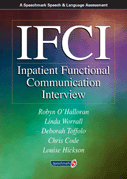 by Robyn O'Halloran, Linda Worrall, Deborah Toffolo, Chris Code & Louise Hickson
by Robyn O'Halloran, Linda Worrall, Deborah Toffolo, Chris Code & Louise Hickson
The IFCI provides speech & language therapists working in the acute hospital setting with a measure of how well in-patients with communication difficulties can communicate in relevant hospital situations.
Full Description:
The IFCI provides speech & language therapists working in the acute hospital setting with a measure of how well in-patients with communication difficulties can communicate in relevant hospital situations. Assessing the patient's ability to communicate is crucial for successful health care. With the IFCI, the therapist has a structured assessment that provides a comprehensive evaluation of the everyday communication needs of patients whilst they are in hospital.
The interview is conducted in three parts: gathering relevant information from the patient's medical history; interviewing the patient and interviewing any relevant members of the health care team. Finally the clinician writes an overall summary, which will describe the patient's ability to communicate in the hospital setting, identifies the strategies that facilitate effective communication and identifies any goals for intervention.
The IFCI consists of fifteen hospital communication situations that were identified by observing the communication that occurs between staff and patients in an acute hospital setting. The situations were selected because they ranked the highest in terms of importance in providing health care, importance from a patient perspective, ease of observation, how typical they were of hospital situations, and that they could all be assessed at the patient's bedside within a 30-45 minute period.
From the Foreword by Professor Audrey Holland: "The IFCI is well conceived and evaluated, timely, and innovative. Its detailed description and organisation guarantee easy administration. [It] provides a map and a flashlight to help practitioners find their way in the almost uncharted territory of the inpatient hospital, and the communication needs of its inhabitants. ... This little gem of an interview approach, thoroughly specified and rich with examples from its extensive pre-testing, straightforwardly provides a way to assess communication needs in this unique setting."
Readership
Speech & language therapists working in the acute hospital setting with adults with communication difficulties, particularly those with aphasia.
About the authors
Robyn O'Halloran is the Speech Pathology Advisor for Scope, Victoria, Australia. Linda Worrall is Associate Professor, Communication Disability in Ageing Research Unit, The University of Queensland, Australia. Deborah Tofffolo is Director, Access Brain Injury Services, NSW, Australia. Chris Code is based in the Department of Psychology, Exeter University, UK. Louise Hickson is Associate Professor, Department of Speech Pathology and Audiology, The University of Queensland, Australia.
92pp, wire-o-bound
Stock: Usually ships in 30-40 business days!
|